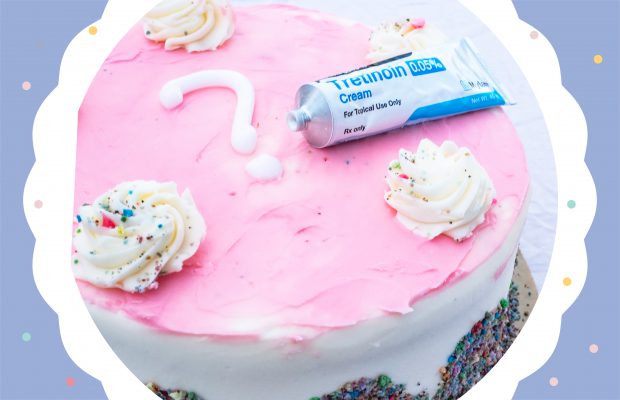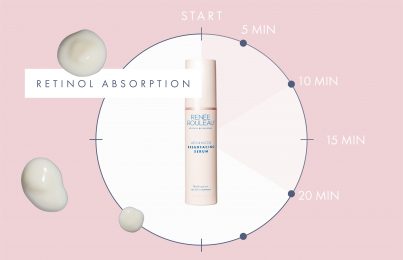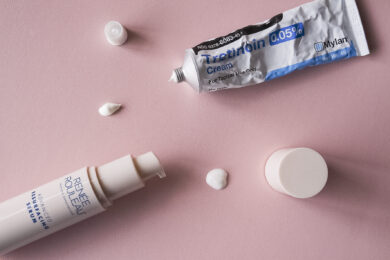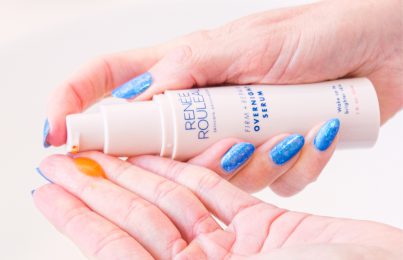Updated 10/9/24. The secret has been out for a long time: retinol is one of the most effective anti-aging ingredients on the market. I can tell you firsthand. I’ve seen clients who started using it consistently in their 30s and are now in their 60s—and the results are absolutely amazing.
Despite this, there’s still a lot of confusion as to how it should be used. One of the most common questions I get asked is, “Renée, what’s the best age for me to start using retinol?” There’s definitely an ideal age range, and it can get more nuanced depending on your skin’s history and needs. Keep reading to learn when you should start using this game-changing ingredient!
What Is Retinol?
First, a quick refresher course. retinoids, which include retinol, are derivatives of vitamin A, which is one of the body’s key nutrients for giving cellular turnover a boost. It’s used in topical skincare products to promote bright, even-toned skin with a smooth texture. It also helps stimulate the production of collagen. Depending on the formula, it can also be helpful for clearing clogged pores and lessening breakout activity.
Types of Retinoids
“Retinoid” is an umbrella term for any ingredient or group of ingredients derived from vitamin A. There are four main categories of retinoids: retinyl esters, retinol, retinaldehyde, and retinoic acid. Retinoic acid is only available by prescription since it’s the strongest of all retinoids. (Make sure you read all about the different types of retinoids and how they work).
I recommend most people start with a gentle, non-prescription retinol product and slowly work their way up. This will help your skin acclimate while minimizing the irritation and inflammation sometimes associated with retinoids.
Depending on your tolerance and skincare goals, you may work your way up to a prescription retinoid, or you may find that non-prescription retinol works well for you. In fact, studies have shown that using retinol consistently over many years can give results similar to using prescription retinoids!
What’s the Best Age to Start Using Retinol?
Generally speaking, I recommend most people start using retinol in their mid to late-20s, anywhere from 25-30. This is when collagen and elastin production starts to slow down, so it’s the perfect time to start reaping the preventative-aging benefits retinol has to offer.
The reason I don’t normally recommend people start using retinol sooner is that it kickstarts the skin’s metabolism. When you’re under 25, your skin is naturally very metabolically active, so introducing retinol could cause overstimulation and inflammation. In addition, a lot of people under 25 are still dealing with breakouts. Since acne is an inflammatory condition, you don’t want to introduce anything that could add fuel to the fire.
The exception would be if you’re using a prescription retinoid to manage blemishes and bumpy skin caused by clogged pores—something that’s best done under the guidance of a dermatologist!
I’ve been using my own retinol formula since I turned 35, and I’m now 55. I tried using a prescription retinoid after meeting the doctor responsible for getting it FDA-approved as a treatment for wrinkles, but I found it was too strong for my eczema-prone skin at the time. I decided to stick with retinol. Fast forward to my mid-40s, and I decided to try a prescription again followed by the application of a moisturizer and was able to use it fairly successfully. I now use it once a week in addition to regularly using my retinol serum.
How Do I Know If I Should Start Using Retinol at Age 25?
So, how do you know whether to start using retinol on the earlier or later end of the spectrum? For the most part, it’s up to you. I’d say the most important thing is being sure you’re ready to make the commitment. Retinol should be used consistently and, once you start, for life!
That said, here are three things that might make me suggest someone start using retinol at age 25 (or soon after).
1. You Have Thin Skin
Thin skin tends to show fine lines and wrinkles more prominently since there isn’t as much of a cushion to “plump” them out. Thin skin is most common in those with fair skin—think Irish or Scandanavian heritage. Three other indications you might have thin skin include (1) easily getting sunburnt, (2) easily getting injuries or breaks in the skin, and (3) quickly developing fine lines when your skin is dehydrated.
One of the most notable benefits of retinol is that it helps thicken the skin over time. If your skin is thin, this will definitely help make fine lines and wrinkles less noticeable in the long run. Start with a gentle formula and work your way up slowly.
2. You Have a History of Excessive Sun Damage
Let’s be honest, there are probably a few of us who got a little too much sun exposure during our teenage years (tanning oil, anyone?). However, if your lifestyle or hobbies have exposed you to excessive sun damage, you may want to consider starting retinol on the earlier side. Examples include lifeguarding, spending lots of time on the beach, and regularly participating in outdoor sports without proper sun protection.
3. You Have Texture Issues from Severe Breakouts
If you had severe breakouts in your teens or early-20s, you know all too well that cystic and nodular blemishes can leave indents behind. Because retinol stimulates collagen production, it’s a great ingredient to help plump out indents over time.
If you’re using retinol mainly to address pitted post-breakout marks, this is one of the few times I would suggest starting out with a prescription retinoid, like tretinoin. You won’t want to jump right in using it every day (you should still build up slowly), but this will be the most effective option for visibly reducing indents. The exception would be if your skin is very sensitive and can’t tolerate a prescription retinoid.
The Bottom Line
Because your skin’s natural collagen and elastin production start slowing down at 25, the best age to start using retinol is 25-30. That said, I don’t want you to get too hung up on exactly when you should start using it. When you start using retinol, you’re playing the long game. As my friend and dermatologist Dr. Ranella Hirsch says, “retinol changes are measured in months and years, not days and weeks. You don’t see your grass growing each day, but it is.”
Getting a head start is great, but the most important thing is that you commit to using your retinol consistently. Start slow, work your way up, and listen to your skin. Whatever it likes best is what’s right for you.
Here are four important things to look for when choosing a retinol product.
Celebrity Esthetician & Skincare Expert
As an esthetician trained in cosmetic chemistry, Renée Rouleau has spent 30 years researching skin, educating her audience, and building an award-winning line of products. Her hands-on experience as an esthetician and trusted skin care expert has created a real-world solution — products that are formulated for nine different types of skin so your face will get exactly what it needs to look and feel its best. Trusted by celebrities, editors, bloggers, and skincare obsessives around the globe, her vast real-world knowledge and constant research are why Marie Claire calls her “the most passionate skin practitioner we know.”




Comments:
Hi please can you help? I am 65 always taken good care of my skin but I am completely out of my depth with the range of skincare. Do I need Retinol. Salicylic Acid, vit C if so how do I incorporate them into my regime and which are best. I appreciate any help please? Thank you
Posted By: Karen |
Hello, Karen! Check out this blog I wrote about skin cycling. https://blog.reneerouleau.com/the-beginners-guide-to-retinol/ This will help you get a deeper understanding of when/ how to use your serums.
Posted By: Renée Rouleau |
Hi, I’m 39 years old and thinking to start on the retinol more serious, for the long term … I’m just wondering how should I implement it as I am also starting with THE BASIC SKIN CARE COLLECTION: SKIN TYPE 3 suggested for my skin type ? Many Thanks and Best Wishes to you and yours !!!
Posted By: Roxana |
Thanks for reaching out about possibly purchasing the Skin type 3 Basic Kit in combination with the retinol. Since retinol can spur the skin into making more cystic acne retinol might not be the right option right now. I would suggest booking a My Skin Rx Virtual Consultation to make sure each part and piece to your simplistic routine is beneficial to all your skincare goals. You can book a consultation appointment here: https://www.reneerouleau.com/pages/spas-virtual-consultations
Posted By: Renée Rouleau |
Hi Renee,
I am 31 & skin type 3. I am starting to have signs of ageing so want to introduce a retinol but am worried it will make the break outs on my chin & jawline worse. Would you recommend I wait until (one day) my skin clears up or perhaps it would be ok to slowly introduce now?
Many thanks
Posted By: Yvette |
That depends on if your breakouts are inflamed or cystic. If they are skip the retinol until your skin calms down. If your breakouts are only congestion-based and not inflamed give retinol a try.
Posted By: Renée Rouleau |
So you don’t use your retinol anymore, you use prescription tretinoin?
Posted By: Martina |
Hi there! I use both but Tretinoin only once per week.
Posted By: Renée Rouleau |